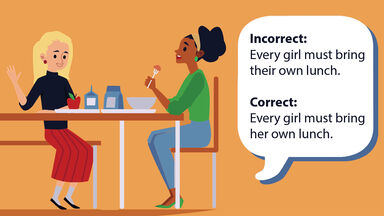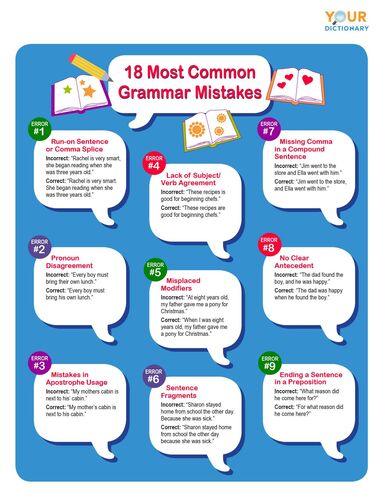I Am Very Smart. I Began Reading When I Was Three Years Old Grammer
18 Most Common Grammar Mistakes
Understanding the eighteen most common grammer mistakes can help y'all improve your writing. When yous know which common grammatical errors to wait for, it's easier to act as your own proofreader and editor.
 Pronoun mistake examples
Pronoun mistake examples
How to Ready Common Grammar Mistakes Printable
If y'all want to proceed a quick reference guide for the most common grammer mistakes handy, you lot can print and hang this grammar fault chart. It features 18 mutual grammar mistakes with examples of how to correct them.

View & Download PDF
1. Run-on Judgement or Comma Splice
A run-on sentence is a judgement that joins two contained clauses without punctuation or the appropriate conjunction. A comma splice is like to a run-on sentence, but it uses a comma to join ii clauses that have no appropriate conjunction. Fixing a run-on sentence or a comma splice can exist accomplished in i of 5 different ways.
Incorrect sentence: "Rachel is very smart, she began reading when she was iii years sometime."
- Solution 1: Split the clauses into two sentences. "Rachel is very smart. She began reading when she was 3 years former."
- Solution ii: Supercede the comma with a semicolon. "Rachel is very smart; she began reading when she was iii years quondam."
- Solution 3: Replace the comma with a analogous conjunction. "Rachel is very smart, for she began reading when she was three years old."
- Solution four: Supplant the comma with a subordinating conjunction. "Rachel is very smart because she began reading when she was 3 years onetime."
- Solution five: Supplant the comma with a semicolon and transitional word or phrase. "Rachel is very smart; as a result, she began reading when she was 3 years old."
two. Pronoun Disagreement
Some of the about common grammar mistakes are pronoun errors. They occur when pronouns practice not agree in number with the nouns to which they refer. If the noun is singular, the pronoun must exist singular. If the noun is plural, the pronoun must exist plural too.
For example:
- Incorrect: "Every girl must bring their own luncheon."
- Correct: "Every girl must bring her own lunch."
Pronoun errors are mutual in modern English, every bit writers try to avoid awkward phrasing or the implication of sexist linguistic communication. Although this is an admirable goal, it is nevertheless important to learn the right grammar and apply it in more formal situations.
3. Mistakes in Apostrophe Usage
Apostrophes are used to show possession. However, you do not utilize an apostrophe after a possessive pronoun such as my, mine, our, ours, his, hers, its, their, or theirs.
For example:
- Incorrect: "My mothers cabin is adjacent to his' cabin."
- Correct: "My mother's motel is next to his cabin."
In the example of information technology's, the apostrophe is used only to signal a contraction for "information technology is."
For instance:
- Incorrect: "Its a cold day for October."
- Correct: "It'south a cold mean solar day for October."
4. Lack of Subject-Verb Understanding
Confusion over subject-verb understanding tin can be the source of many grammatical errors. When speaking or writing in the present tense, a judgement must accept subjects and verbs that agree in number. If the field of study is atypical, the verb must be atypical. If the bailiwick is plural, the verb must be plural as well.
For example:
- Incorrect: "These recipes is good for beginning chefs."
- Correct: "These recipes are proficient for showtime chefs."
5. Misplaced Modifiers
To conspicuously communicate your ideas, you should identify a modifier directly next to the word information technology is supposed to modify. The modifier should clearly refer to a specific discussion in the sentence. Misplaced modifiers tin can create confusion and ambivalence.
For case:
- Incorrect: "At 8 years quondam, my father gave me a pony for Christmas."
- Correct: "When I was eight years former, my father gave me a pony for Christmas."
6. Sentence Fragments
Judgement fragments are also common grammar mistakes. A sentence needs to take a subject area and a verb. A fragment ofttimes happens later on another related idea has been expressed.
For example:
- Incorrect: "Sharon stayed abode from school the other day. Considering she was ill."
- Correct: "Sharon stayed habitation from school the other twenty-four hours because she was sick."
7. Missing Comma in a Chemical compound Sentence
A compound sentence expresses two complete and related ideas, and it usually includes a conjunction to connect these two parts. There should be a comma before the conjunction to bespeak the two ideas are related. If that's missing, it's a fault readers will detect.
For example:
- Wrong: "Jim went to the store and Ella went with him."
- Correct: "Jim went to the store, and Ella went with him."
8. No Clear Antecedent
An ancestor is a word that comes earlier a pronoun and helps the reader understand what the pronoun ways. Generally, you can clear up this confusion by rearranging the wording.
For example:
- Wrong: "The dad found the boy, and he was happy."
- Correct: "The dad was happy when he found the male child."
ix. Catastrophe a Sentence in a Preposition
Another common grammar mistake is catastrophe a sentence with a preposition. A preposition, by its nature, indicates that another word volition follow it. In casual chat, this type of fault is no large deal, just you should avoid this mistake in your writing.
For example:
- Incorrect: "What reason did he come here for?"
- Correct: "For what reason did he come here?"
ten. Mixing Upward Spellings
In that location are words that sound the same but have dissimilar spellings and meanings. If you mix these up, it tin can be an embarrassing mistake. These are a few of the virtually normally confused words:
- "You're" vs. "your"
- "To" vs. "two" vs. "as well"
- "Weather" vs. "whether"
- "There" vs. "their"
For instance:
- Incorrect: "In that location male parent went to school there."
- Correct: "Their father went to schoolhouse in that location."
11. Mixing Upward Similar Words
Sometimes, it'due south not a matter of mixing up the spelling as much as an fault in word choice. There are many words that sound similar only have unlike meanings and spellings. These include the post-obit:
- "Affect" and "upshot"
- "Except" and "accept"
- "Incorporate" vs. "etch"
- "Further" vs. "further"
For example:
- Incorrect: "The rain had a good bear upon on the farmer's field."
- Right: "The rain had a expert effect on the farmer's field."
12. Unnecessary Commas
While commas are of import for clarity and give the reader a chance to pause in the sentence, it'southward possible to use commas when you don't need them. These unnecessary commas can be disruptive to read, and they brand writing look less professional. Before you lot use a comma, think about why yous're using information technology. If you aren't sure information technology'due south needed, double-bank check past reviewing comma rules.
For example:
- Incorrect: "She had a tummy ache, because she ate likewise much ice cream."
- Correct: "She had a breadbasket ache because she ate besides much ice cream."
13. Mixing Up Possessives and Plurals
People often go confused when adding an "s" to the finish of a word. When do you need an apostrophe? In general, you lot utilise an apostrophe before an "due south" to bear witness possession or as a contraction, like "that's" for "that is." If you're merely trying to say something is plural, yous don't need the apostrophe. Like most rules in the English language, this has some variation. Even so, if you continue the general guidelines in listen, y'all'll be correct virtually of the fourth dimension.
For example:
- Incorrect: "The dogs dish was total of os'southward."
- Correct: "The canis familiaris's dish was full of bones."
14. Mistakes With Well and Good
One of the most common grammatical errors is mixing upward "well" and "skillful." In general, "well" is an adverb, while "proficient" is an describing word. When you aren't sure which 1 to utilise, simply ask yourself whether an adjective or an adverb is appropriate for the state of affairs.
For case:
- Wrong: "I am doing adept in math."
- Right: "I am doing well in math."
xv. Comparisons That Are Incomplete
When yous use a discussion that has a comparative aspect, you lot need to compare it to something else. These mutual grammatical errors may appear in advertisements or market slogans, but it does non piece of work well in papers or other writing. If the word requires a comparing, you should ever provide it.
For example:
- Incorrect: "My pilus is smoother and softer."
- Correct: "My hair is smoother and softer than it was a month ago."
xvi. Mixing Up Adverbs and Adjectives
If yous mix up adverbs and adjectives, this tin be an embarrassing grammar fault. This is the kind of error that can annoy a teacher or make the departure between a dandy grade on an essay and getting marked down. This happens most oft with words that terminate in "-ly."
For example:
- Wrong: "Susan gave me a real dainty bouquet of flowers."
- Right: "Susan gave me a really prissy bouquet of flowers."
17. Confusion Between Fewer and Less
Many people mix up "fewer" and "less." If you're talking about the amount of something, you demand to decide whether the item is all one matter or a group of many things. If it's a group of many smaller things, yous should use "fewer." If it's i thing, you should use "less."
For case:
- Incorrect: "The shop was almost out of canis familiaris nutrient. There were less cans on the shelves than there were yesterday."
- Correct: "The store was about out of dog food. There were fewer cans on the shelves than there were yesterday."
18. Championship Capitalization Problems
Knowing when to capitalize the words in a championship tin can be very confusing. In general, you should capitalize the first and last words, all nouns and pronouns, all verbs, and all adjectives and adverbs. However, at that place are specific title capitalization rules depending on the style you are using.
For example:
- Incorrect: "Around the globe in lxxx days"
- Right: "Effectually the World in 80 Days"
Additional Grammer Resource from YourDictionary
YourDictionary has an extensive listing of links of grammar rules and tips. Taking reward of like shooting fish in a barrel-to-empathize lessons and examples can help yous polish your grammatical skills while working at a time that best fits your busy schedule. If English is not your native language, there are also links on YourDictionary to resources that explain the near common grammatical mistakes for ESL students.
I Am Very Smart. I Began Reading When I Was Three Years Old Grammer
Source: https://grammar.yourdictionary.com/grammar-rules-and-tips/5-most-common.html